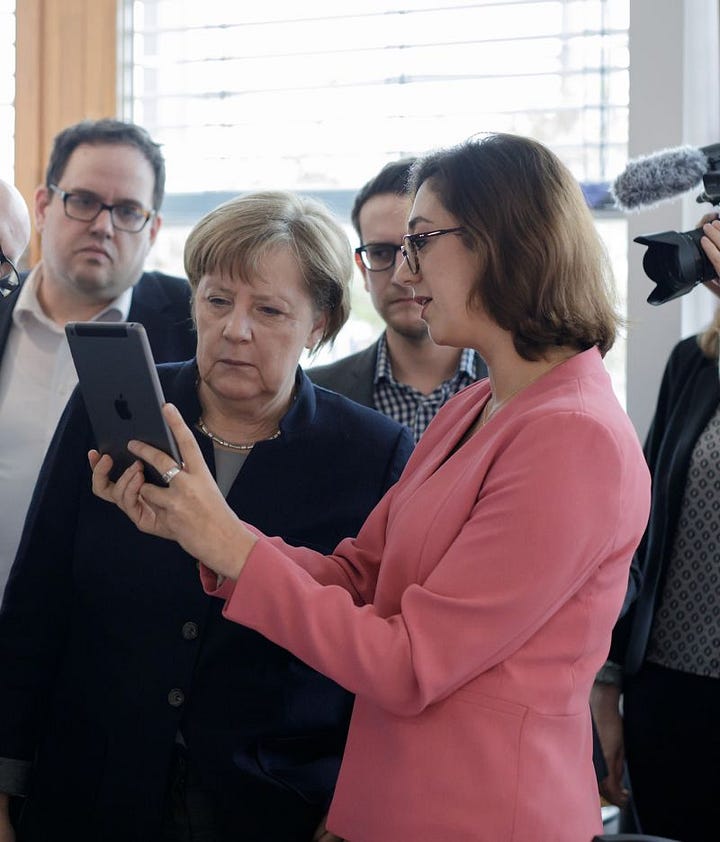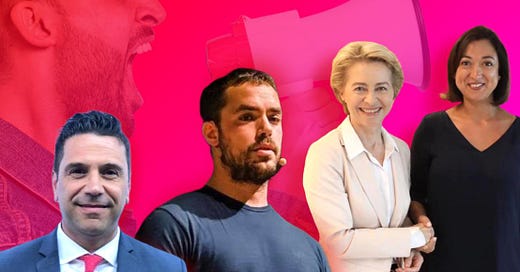What are the digital trends for politics and diplomacy?
We have so many questions and we asked some experts... This is part 1, stay tuned for more in the coming weeks.
💬 CONVERSATION STARTERS this week:
“AI has clear limitations as far as the very nature of diplomacy”
“We are seeing in real time the importance of image on social media for diplomacy”
As we head towards the end of this year’s global election super-cycle with over 70 countries going to the polls, and as we prepare to welcome 2025, we asked a few experts about their predictions for the new year as well as about the state of politics and diplomacy in this fast digital age.
This is PART 1, with Gerry Diaz Bartolome, Anja Gabriel, and Alessandro Tommasi.
Stay tuned for more in the next few weeks!
Gerry Diaz Bartolome: “AI has clear limitations as far as the very nature of diplomacy”
* Gerry Diaz Bartolome is a career diplomat and a keen advocate of digital diplomacy. Past postings include Washington DC and the United Nations in New York. He's currently Director of Strategic Communication and Public Diplomacy, and Spokesperson at Argentina's Ministry of Foreign Affairs in Buenos Aires.
1) Do artificial intelligence and generative AI have the potential to replace ambassadors and diplomats?
Definitely not, as AI has clear limitations as far as the very nature of diplomacy is concerned. And fortunately not, as diplomacy is and will always remain a face-to-face business precisely because of its nature.
AI can be of great help also in many aspects of diplomacy but it will never be able to create the trust or intimacy of a friendly and relaxed conversation with colleagues over a coffee or a meal. Navigating nuances, conveying subtlety with a purpose in mind and having the capacity to read and react (if at all) to human expressions you can only see or hear in person is, by definition, a human experience.
2) Is the diplomatic community embracing AI and what are the challenges ahead?
Diplomats and Foreign Ministries are becoming more and more aware of the benefits of applying AI to many of their tasks; in that process they are also acknowledging the limitations they face in so doing. However, recognizing the challenges enhances the importance of the actual benefits and many embassies and consulates are making growing use of AI technological tools for certain tasks.
Consular diplomacy still appears as the more fertile soil for AI and automation through the use of chatbots and predicted prompts online. Reporting, one of the main diplomatic ‘functions’, is certainly also susceptible to the benefits of AI in terms of production speed and variety of sources on the spot. Authenticity and accuracy will always remain a challenge though, which requires to duly verify sources and information. Also as important is the need to never miss the personal insight only gained through in situ diplomacy and human personal engagement as a privileged source of information, both key in diplomacy to justify a sound judgement and, why not, even a prediction.
3) What are your predictions for digital diplomacy next year and beyond, in particular in terms of AI?
Digital diplomacy will continue to expand and also to sophisticate in its trend to transcend mere posting in social and use of internet. Organizational changes within Foreign Ministries to systematize and expand the use of technology in diplomacy are not only welcome but growing in many countries.
Not only diplomats are resorting more to AI on their own to help them in their daily work (think of assistance in reporting, translating, targeting outreach and messaging, to mention but a few); diplomats are also accompanied and encouraged by their Foreign Ministries through organizational change and technological training to provide them with AI tools to ease them in the unavoidable bureaucratic part of their job and promote those functions of diplomacy such as negotiation and representation that only humans can perform through personal engagement and persuasion.
Anja Gabriel: “Leaders should aim to ensure their target audiences understand who they are, what they stand for and what their political core ideas and subjects are.”
* Anja Gabriel is an independent communications strategist and advisor on digital political communications. She has worked with the President of the European Commission, Ursula von der Leyen, and the President of the European Council, Charles Michel.


1) What do you love about your job and what do you see are the biggest challenges?
As an independent communications consultant, I love the freedom and flexibility to work simultaneously with various political players and organizations across multiple disciplines — from giving social media trainings and developing communication strategies and campaigns, to building political personal brands.
In an increasingly fragmented social media environment, the biggest challenge for political actors and institutions is effectively reaching their peer groups and creating suitable, credible, and impactful messages that resonate.
2) What's the best social media advice you can give to leaders — whether presidents and prime ministers, ambassadors, or politicians — in today's world?
My advice is to strategically leverage available social media tools and formats to build their political brand over time. Leaders should aim to ensure their target audiences understand who they are, what they stand for and what their political core ideas and subjects are. Additionally, it’s crucial to implement personalized communication to achieve these goals.
3) What are your predictions for digital diplomacy next year and beyond?
I anticipate that three major election campaigning trends from this "super election year" will carry over into digital diplomacy in the next year and beyond:
Increased use of TikTok and meme content: Digital diplomacy will embrace TikTok more actively, incorporating meme-driven content to engage Gen Z.
Greater collaboration with influencers and content creators: As political content gains traction on social media platforms and influencers and content creators play a significant role in shaping public opinion, particularly among young people, we can expect more partnerships and activities involving these creators in diplomacy.
Strategic integration of Generative AI: Digital diplomacy will shift from experimenting with Generative AI tools to strategically implementing them for content planning, content creation, analysis and building communication campaigns.
Alessandro Tommasi: “We are seeing in real time the importance of image on social media for diplomacy”
* , founder of Will and NOS, now working on his next venture (stay tuned)… He’s the author of here on Substack.
1) What are your top takeaways from working at the intersection of politics, the media, and social media?
The main takeaway is simple: they are extremely connected and yet so different. Also, media — as well as politics — are not getting out of the bonanza moment deriving from the pandemic. During COVID lockdowns people wanted more news in their social media feeds and that changed the whole scenario. Politicians quickly filled the gap between themselves and citizens. Those in office especially took lots of advantage. Now, the scenario is crowded, barriers are low to non existing, and therefore the message and the talent are key.
2) What can diplomacy learn from politics, in particular in the way politics leverages the digital era?
We are seeing in real time the importance of image on social media for diplomacy. The Russian invasion — and most importantly the Ukrainian resistance — took an unexpected turn when President Zelensky appeared on social media, in the middle of the night with his cabinet in Kyiv. On the other hand, something extremely complicated as the Israeli-Palestinian conflict is very very hard to handle on social media where the brutality of the images of people dying, starving, or event burnt alive leave very limited space to the complexity and time diplomacy needs.
3) What are your predictions for politics after this 2024 global election super-cycle with over 70 countries going to the polls?
I lost my election. So I should probably abstain on this one, ahah... Anyway! What we are seeing, I believe, is that at the same time some trends are pretty much the same across the globe (extremely fast cycle of any news, polarization, copy-paste of formats and tone of voices, raising role of gatekeepers outside of the traditional arena) we also see the relevance of the design of the rules governing the elections... the European Parliament elections still felt very distant from 500 million citizens. They were more like national referendums. Something very different from the US or India. I think one thing is shared: the last decade was about open or closed society, now it's more about going back or trying to draw a future, but it seems that no politician is able to draw a clear image of what is ahead of us.







